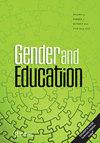Indigenous cosmologies and black onto-epistemologies in gender and education
IF 1.9
3区 教育学
Q2 EDUCATION & EDUCATIONAL RESEARCH
引用次数: 0
Abstract
This issue of Gender and Education explores the relationship of Indigenous and Black ontoepistemologies, cosmologies and practices to gender and education in the broadest sense. It serves as an instance of how to rethink the colonial underpinnings of our contemporary understandings of gender and education. It is not news that feminisms have been confined to colonial logics and settler colonialist ideals. As Shari Huhndorf and Cheryl Suzack (2010, 1) wrote more than a decade ago, ‘despite [important] interventions and the urgency of gender analysis specific to Indigenous communities, Indigenous women and feminist issues remain unexamined in contemporary feminist theory’. Black feminist writer bell hooks also warned long ago ‘that many women have appropriated feminism to serve their own ends, especially those white women who have been at the forefront of the movement’ (hooks 1981). Drawing on Indigenous feminist and gender theories and Black feminisms, this special issue is a crucial (yet minor) step towards decolonial and anticolonial knowledge production in gender and education. The collection of articles, taking seriously this journal’s feminist commitment, challenges the dominance of colonial thought practices in educational academic work. Without a doubt, the authors in this issue push the field of gender and education studies in unique directions, recognizing both the indebtedness of feminist research to Indigenous and Black onto-epistemologies, cosmologies and practices, as well as the knowledges from the margins that have been ‘developed, in a wide range of forms, over thousands of years, prior to and outside of the creation of universities’ (Coburn 2020, 430). As guest coeditors, we enter into this special issue from different locations and position (alitie)s. Veronica is a settler in (what is for now called) Canada; she grew up in Argentina under military coups, from which she inherited a process of whitening the nation state. Veronica’s work in early childhood education seeks to unsettle the violent colonial acts of child development always already embedded within pedagogy (e.g. Pacini-Ketchabaw and Montpetit 2019; Vintimilla and Pacini-Ketchabaw 2020). Tuija is a feminist Indigenous scholar coming from educational gender studies. Originally from a small village in the northernmost part of Finland, she is an Inari Sámi Indigenous person from a workingclass background. The strengths, positionalities and vulnerabilities of that mixture have性别与教育中的土著宇宙论与黑人本体认识论
本期《性别与教育》探讨了最广泛意义上的土著和黑人本体认识论、宇宙论和实践与性别和教育的关系。它是一个例子,说明如何重新思考我们当代对性别和教育理解的殖民基础。女权主义一直局限于殖民逻辑和定居者的殖民主义理想,这并不是什么新闻。正如Shari Huhndorf和Cheryl Suzack(2010, 1)在十多年前所写的那样,“尽管[重要的]干预措施和针对土著社区的性别分析的紧迫性,土著妇女和女权主义问题在当代女权主义理论中仍未得到研究”。黑人女权主义作家贝尔·胡克斯(bell hooks)很久以前也警告说,“许多女性利用女权主义来达到自己的目的,尤其是那些走在运动前沿的白人女性”(hooks 1981)。借鉴土著女权主义和性别理论以及黑人女权主义,这一特殊问题是在性别和教育方面向非殖民和反殖民知识生产迈出的关键(但微不足道)一步。文章的收集,认真对待这个杂志的女权主义承诺,挑战殖民思想实践在教育学术工作中的主导地位。毫无疑问,本期的作者将性别和教育研究领域推向了独特的方向,认识到女权主义研究对土著和黑人的认识论、宇宙论和实践的贡献,以及来自边缘的知识,这些知识“在大学创建之前和之后的数千年里以各种形式发展起来”(Coburn 2020, 430)。作为客座编辑,我们将从不同的位置和立场切入本期特刊。维罗妮卡是加拿大的移民(现在叫加拿大);她在阿根廷的军事政变中长大,从那里她继承了一个美白民族国家的过程。维罗妮卡在幼儿教育方面的工作旨在消除教学法中一直存在的儿童发展的暴力殖民行为(例如Pacini-Ketchabaw和Montpetit 2019;Vintimilla and Pacini-Ketchabaw 2020)。Tuija是一位从事教育性别研究的土著女性主义学者。她来自芬兰最北部的一个小村庄,是伊纳里Sámi工人阶级背景的土著居民。这种混合的优势、优势和弱点都有
本文章由计算机程序翻译,如有差异,请以英文原文为准。
求助全文
约1分钟内获得全文
求助全文
来源期刊

Gender and Education
EDUCATION & EDUCATIONAL RESEARCH-
CiteScore
5.20
自引率
9.10%
发文量
31
期刊介绍:
Gender and Education grew out of feminist politics and a social justice agenda and is committed to developing multi-disciplinary and critical discussions of gender and education. The journal is particularly interested in the place of gender in relation to other key differences and seeks to further feminist knowledge, philosophies, theory, action and debate. The Editors are actively committed to making the journal an interactive platform that includes global perspectives on education, gender and culture. Submissions to the journal should examine and theorize the interrelated experiences of gendered subjects including women, girls, men, boys, and gender-diverse individuals. Papers should consider how gender shapes and is shaped by other social, cultural, discursive, affective and material dimensions of difference. Gender and Education expects articles to engage in feminist debate, to draw upon a range of theoretical frameworks and to go beyond simple descriptions. Education is interpreted in a broad sense to cover both formal and informal aspects, including pre-school, primary, and secondary education; families and youth cultures inside and outside schools; adult, community, further and higher education; vocational education and training; media education; and parental education.
 求助内容:
求助内容: 应助结果提醒方式:
应助结果提醒方式:


